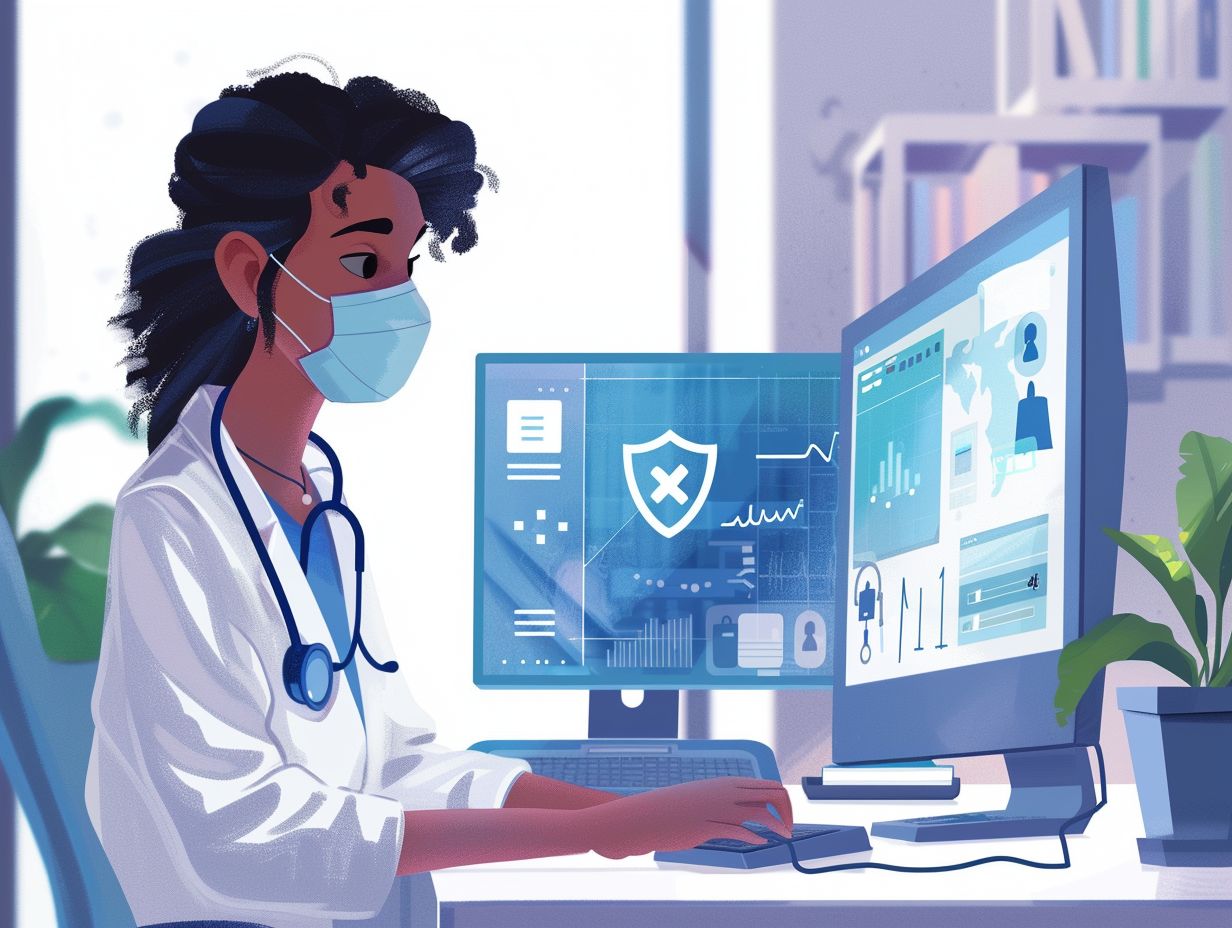In today’s digital age, protecting patient data in the healthcare industry is more crucial than ever. EC-Council’s Certified HealthCare Security Specialist certification equips professionals like you with the necessary skills and knowledge to safeguard sensitive information from potential risks.
You will gain an understanding of HIPAA compliance, security protocols, and procedures through this certification, making data protection and compliance top priorities in your role.
If you are interested in becoming a Certified HealthCare Security Specialist, continue reading to learn about the training and exam requirements to kickstart your career in healthcare data security.
Key Takeaways:

Overview of the Certification
The EC-Council University offers you a comprehensive certificate program in cyber security designed for individuals and organizations seeking to enhance their skills and knowledge in the field. This program will provide you with the necessary certifications and expertise required to excel as a cyber security professional in today’s technology-driven world.
The structure of the certification program includes a combination of theoretical knowledge and practical hands-on experience, covering essential areas such as ethical hacking, network security, risk management, and digital forensics. By obtaining these certifications, you not only validate your skills but also gain a competitive advantage in the job market.
This program places a strong emphasis on utilizing cutting-edge technology to offer a real-world learning experience, equipping you to effectively address complex cyber threats. The certifications you earn through this program are globally recognized, opening up numerous career opportunities in cybersecurity across various industries.
Why is Healthcare Data Security Important?
Healthcare data security is vital for safeguarding patient information in light of its sensitive nature and the escalating frequency of cyber incidents targeting vulnerabilities within healthcare systems. To protect patient data and comply with industry regulations, it is essential to effectively manage security protocols, incident response procedures, and cyber forensics.
Healthcare organizations must address various vulnerabilities that can jeopardize the security of patient data. These vulnerabilities often include weak password policies, outdated software systems, absence of encryption, and internal threats. As cyber incidents like data breaches, ransomware attacks, and phishing scams continue to increase, robust security measures become increasingly critical. Cyber security certifications are instrumental in equipping healthcare professionals with the requisite skills and knowledge to safeguard sensitive information effectively.
Implementing information management practices such as data encryption, access control, and routine audits is paramount in mitigating risks and upholding data integrity. The Cyber Centre serves as a central platform for sharing best practices, intelligence, and resources aimed at enhancing the resilience of healthcare systems against evolving cyber threats.
Risks to Patient Data
Patient data faces numerous risks in today’s cyber landscape, ranging from unauthorized access by individuals to targeted cyber attacks on healthcare organizations. These vulnerabilities highlight the critical need for robust information security measures and skilled professionals who can mitigate risks and protect sensitive healthcare data.
Insider threats, such as employees accessing patient information without authorization, pose a significant risk to data security. In addition, external attacks, including malware infections and phishing schemes, can compromise patient records and disrupt healthcare services. Data breaches, whether intentional or accidental, can have severe consequences for patients’ privacy and trust in the healthcare system. Effective risk management practices, incident response procedures, and advanced technologies like encryption and access controls are essential in safeguarding patient data against these threats within healthcare systems.
The Role of a Certified HealthCare Security Specialist
As a Certified HealthCare Security Specialist, you play a crucial role in safeguarding patient data and ensuring the integrity of healthcare information systems. By completing the certificate program offered by EC-Council University, you acquire the necessary skills to address cyber security challenges specific to healthcare environments.
Your responsibilities include implementing security measures to protect electronic health records and ensuring that only authorized personnel have access to sensitive patient information. It is crucial for Healthcare Security Specialists to stay updated on the latest threats and vulnerabilities in the industry in order to proactively mitigate risks.
The EC-Council University certificate program equips you with knowledge in risk management, incident response, and compliance regulations, preparing you to handle complex security incidents and maintain confidentiality within healthcare organizations.
Responsibilities and Skills

As a Certified HealthCare Security Specialist, you are tasked with implementing and maintaining security measures to safeguard patient data, conducting thorough risk assessments, and ensuring adherence to industry regulations. Your role requires a diverse skill set acquired through the completion of a specialized graduate certificate program, enabling you to effectively address the intricate cybersecurity challenges present in healthcare environments.
Your primary responsibilities typically involve overseeing access control, monitoring security systems, and promptly responding to any security incidents that may arise. Essential skills for Healthcare Security Specialists include strong analytical capabilities, a deep understanding of healthcare IT systems, meticulous attention to detail, and excellent communication skills necessary for collaborating with a variety of stakeholders.
Specialized training obtained through a graduate certificate program equips professionals like yourself with the expertise needed to remain informed about the latest threats and security protocols within the fast-paced and constantly evolving healthcare industry.
Key Concepts in Healthcare Data Security
Healthcare data security involves essential concepts like data encryption, access control, incident response, and risk management to protect patient information from cyber threats and unauthorized access. Understanding these key concepts is crucial in maintaining the integrity and confidentiality of healthcare systems.
Encryption methods are pivotal in transforming sensitive patient data into unreadable ciphertext, ensuring that even if the data is intercepted, it remains secure. Access control mechanisms determine who can access patient information and under what circumstances, thereby reducing the risk of unauthorized access. Incident response strategies establish procedures to follow in the event of a security breach, facilitating prompt detection and containment of threats. Risk mitigation practices comprise proactive measures aimed at identifying and addressing potential vulnerabilities to prevent data breaches and ensure the overall security of healthcare systems.
HIPAA Compliance
HIPAA compliance is a crucial component of healthcare data security that demands adherence to stringent regulations for safeguarding patient information. To ensure compliance with HIPAA standards, organizations must establish robust security measures, conduct routine risk assessments, and maintain comprehensive documentation of security protocols and procedures.
Organizations are required to restrict employee access to patient data exclusively to authorized personnel, implementing strict controls to prevent data breaches. Compliance with HIPAA also entails the implementation of ongoing training programs for staff members to enhance awareness of data privacy practices.
Regular audits are performed to assess compliance levels and pinpoint areas in need of enhancement. Failure to comply can lead to significant penalties, including fines and legal repercussions, underscoring the necessity for healthcare entities to prioritize HIPAA compliance as a foundational element of their operational practices.
Security Protocols and Procedures
Implementing effective security protocols and procedures is crucial for healthcare data security, ensuring the confidentiality, integrity, and availability of patient information.
It is essential to establish robust access control measures to prevent unauthorized access to sensitive data. This includes enforcing strong password policies and user authentication mechanisms. Additionally, encryption methods are critical for protecting data both at rest and in transit, shielding it from unauthorized interception or exposure.
In case of a security breach or incident, well-defined incident response protocols are invaluable. They enable healthcare entities to respond promptly, mitigate the impact, and restore critical systems to ensure uninterrupted patient care.
Benefits of Hiring a Certified HealthCare Security Specialist
Utilizing a Certified HealthCare Security Specialist offers your organization numerous advantages, including heightened data protection, adherence to regulatory requirements, and a more effective response to cyber incidents. These professionals possess specialized expertise acquired through completion of a graduate certificate program, equipping them to adeptly address security challenges within healthcare settings.
Their comprehensive knowledge enables them to implement robust security protocols customized to safeguard sensitive healthcare information, effectively preventing unauthorized access and proactively managing potential breaches. Their familiarity with regulatory mandates ensures that your organization remains in compliance with industry standards, thereby reducing the likelihood of penalties and legal consequences.
Healthcare Security Specialists are prepared to promptly address security breaches, minimizing disruptions and safeguarding critical medical data. By doing so, they help cultivate trust among patients and stakeholders, ultimately enhancing the reputation and credibility of the organization.
Ensuring Data Protection and Compliance

You, as a Certified HealthCare Security Specialist, play a vital role in ensuring data protection and regulatory compliance within healthcare organizations. By leveraging your expertise and experience, you help mitigate cyber risks, maintain secure information systems, and uphold industry standards for data confidentiality and integrity.
Your contribution is crucial in safeguarding sensitive patient information and preventing unauthorized access to medical records. You work closely with IT teams to implement robust security measures, conduct risk assessments, and develop incident response protocols. By staying abreast of evolving cybersecurity threats and regulatory changes, you proactively address vulnerabilities, strengthen defenses, and support the overall security posture of healthcare facilities. Your vigilance and diligence help instill trust among patients and ensure the reliable protection of healthcare data.
How to Become a Certified HealthCare Security Specialist
Achieving the status of a Certified HealthCare Security Specialist requires the successful completion of a specialized certificate program offered by EC-Council University. This program encompasses intensive training modules and certification exams. As a prospective professional, you must satisfy all program requisites, demonstrate proficiency in critical cybersecurity domains, and pass the certification exam in order to acquire the essential credentials.
The Certified HealthCare Security Specialist certificate program is meticulously crafted to provide individuals with the fundamental knowledge and competencies necessary to protect sensitive healthcare data and systems. Participants in the program explore a variety of cybersecurity subjects such as risk management, information security policies, incident response, and threat detection. Through a series of training modules, applicants encounter diverse real-world scenarios and engage in practical exercises to ensure they are adequately equipped to address security challenges specific to the healthcare sector.
Upon successfully concluding the program, individuals are mandated to undertake a comprehensive certification exam. This assessment evaluates their comprehension of healthcare security best practices and their capacity to apply these principles effectively in a professional environment.
Training and Exam Requirements
The training and exam requirements for the Certified HealthCare Security Specialist program offered by EC-Council University are designed to assess your knowledge and skills in healthcare data security. Through comprehensive training modules and certification exams, you can demonstrate your proficiency in key cybersecurity concepts and earn industry-recognized certifications.
The training curriculum covers essential areas such as HIPAA regulations, data breach response, risk management in healthcare environments, secure communication practices, and incident handling procedures. As a participant, you will engage in hands-on labs and real-world simulations to apply your knowledge in practical scenarios. The certification exams are structured to test your understanding of security protocols, encryption techniques, and vulnerability assessment methodologies specific to healthcare systems.
By obtaining certifications in healthcare data security, you can enhance your career prospects, credibility in the field, and contribute to safeguarding sensitive patient information.
Frequently Asked Questions
What is EC-Council’s Certified HealthCare Security Specialist program?
EC-Council’s Certified HealthCare Security Specialist program is a certification designed for professionals in the healthcare industry who are responsible for protecting patient data. It provides the necessary skills and knowledge to identify and mitigate security risks in healthcare organizations.
Why is it important to protect patient data?

Protecting patient data is crucial for maintaining trust in the healthcare system and ensuring patient privacy. Patient data includes sensitive information such as medical records, personal information, and financial data, which can be used for identity theft, fraud, and other malicious activities if it falls into the wrong hands.
What are some common security threats in the healthcare industry?
Some common security threats in the healthcare industry include ransomware attacks, data breaches, insider threats, and social engineering attacks. These threats can compromise patient data and disrupt healthcare operations, leading to financial and reputational damage.
How does EC-Council’s Certified HealthCare Security Specialist program help protect patient data?
The program covers a wide range of topics including risk assessment, data privacy and compliance, incident response, and secure network architecture. It equips professionals with the knowledge and skills to implement security measures and protocols that safeguard patient data from potential threats.
What are the prerequisites for taking the Certified HealthCare Security Specialist program?
To enroll in the program, individuals must have at least two years of work experience in the healthcare industry or possess a relevant degree in information security or healthcare. They must also pass the Certified Network Defender (CND) exam or have equivalent knowledge and experience.
What are the benefits of becoming a Certified HealthCare Security Specialist?
Becoming a Certified HealthCare Security Specialist demonstrates a high level of competence and expertise in protecting patient data. It can lead to career advancement opportunities and higher salary potential. Additionally, it allows professionals to stay updated on the latest security threats and best practices in the healthcare industry.
